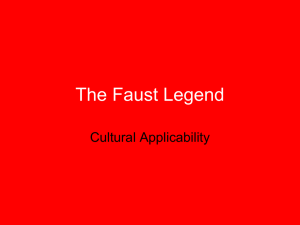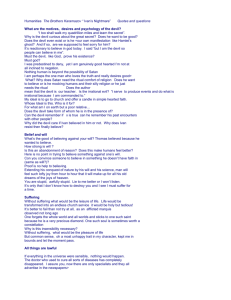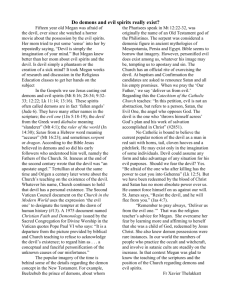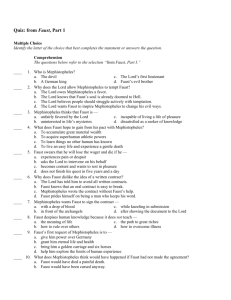Twelfth Sunday after Pentecost (Proper 17 A)
advertisement
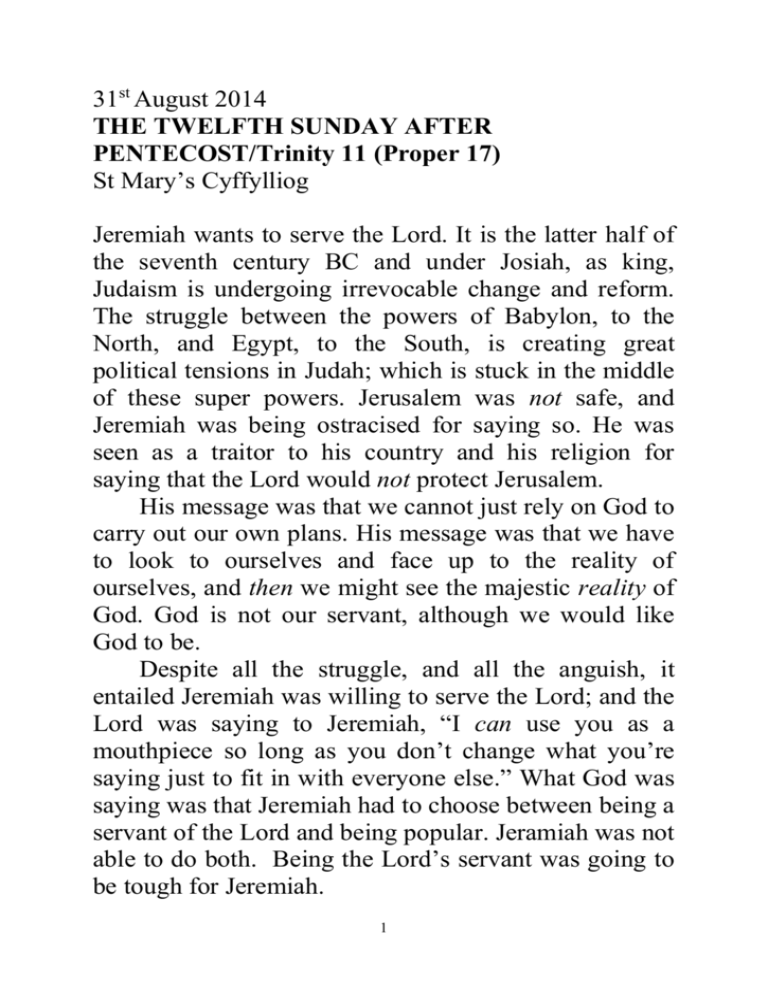
31st August 2014 THE TWELFTH SUNDAY AFTER PENTECOST/Trinity 11 (Proper 17) St Mary’s Cyffylliog Jeremiah wants to serve the Lord. It is the latter half of the seventh century BC and under Josiah, as king, Judaism is undergoing irrevocable change and reform. The struggle between the powers of Babylon, to the North, and Egypt, to the South, is creating great political tensions in Judah; which is stuck in the middle of these super powers. Jerusalem was not safe, and Jeremiah was being ostracised for saying so. He was seen as a traitor to his country and his religion for saying that the Lord would not protect Jerusalem. His message was that we cannot just rely on God to carry out our own plans. His message was that we have to look to ourselves and face up to the reality of ourselves, and then we might see the majestic reality of God. God is not our servant, although we would like God to be. Despite all the struggle, and all the anguish, it entailed Jeremiah was willing to serve the Lord; and the Lord was saying to Jeremiah, “I can use you as a mouthpiece so long as you don’t change what you’re saying just to fit in with everyone else.” What God was saying was that Jeremiah had to choose between being a servant of the Lord and being popular. Jeramiah was not able to do both. Being the Lord’s servant was going to be tough for Jeremiah. 1 As it was tough, at times, for Jesus who, on being baptised, was thrust into wilderness conflict with the devil. Having endured the forty days of temptation thirst Jesus knew the voice of the devil well enough. So, when Jesus says to Peter, “Get behind me Satan!” he really means it. He is not saying that he doesn’t agree with Peter. He is not saying that he doesn’t like the sound of what Peter is saying. Jesus knows the voice of Satan and hears that same voice in Peter, at that instant. Peter was voicing a much more palatable option, a much more attractive route, but Jesus sniffed it out straight away as a deception and a way of conveniently avoiding God’s service. I wonder if we ever take the easier option and become willing to fall for a deception. (I think I know the answer already). The devil is not something we talk about much these days. Indeed, as the devil himself says in the famous German play Faust, “The world is so enlightened, nowadays, that even the devil has been civilized” (p. 144). Goethe’s play Faust is reminiscent of the book Job in that the opening scene is one set in the heavenly realm where the devil is given permission, by God almighty, to tempt Doctor Faust while he is on earth. “Good, then: it is granted you!” says the Lord to Satan: “Divert this spirit from his primal source; Lead him, if you can grasp him, Down your own path with you – and stand abashed When against your will you must confess: 2 A good man, struggling in his darkness, Still knows the one true way” (p. 18). So, here he comes, the greatest deceiver of all, in the form of a poodle, into Doctor Faust’s study. Quoting Doctor Faust’s lines, Act III: “Field and meadow I’ve forsaken; They lie hidden, now, in deepest night. In holy and foreboding awe, Within us, the better soul awakes. Sleeping, now, is each wild longing, Sleeping, each ungoverned act; The love of man revives within us – Within us, the love of God revives. Be quiet, poodle! Stop running up and down! Why do you keep sniffing at my doorsill? Come, lie down here behind the stove – I’ll give you my best cushion. As, yonder, on the mountain path, You pleased us with your running and your jumping, So, now, accept my hospitality, …But what’s this I see? Can such things really happen? Is it illusion? Is it reality? How tall and broad my poodle’s getting! He looms up mightily – That is not the shape of any dog! 3 What king of spectre have I brought into the house?” (P. 67-68). Crucially, the devil appears not at all as Faust would have expected the devil. And this is just the thing because from the very start of their conversation the devil is not only many steps ahead, but, entirely misleading and thorough, and utter, falsity through and through. Rather than being at all scary the devil comes across, in Faust, as rather harmless; and within no time at all it is Doctor Faust who believes that he is controlling the devil. I am sure we moderns ignore the devil at our own peril, but I am not always sure why, or even how, to say this. The devil is, after all, about evil at the individual and personal level; the individual’s struggle with evil. When people think about evil these days they might be more ready to think about collective, and social, evils such as warfare between nations, the destruction of the environment, or the dehumanising effect of large corporations. But the devil is about the individual’s personal and private struggle with evil. There certainly are times when if we are not proactive, and diligently prayerful, in protecting ourselves against destructive forces we risk losing our way most spectacularly. There certainly are times when all our best efforts end in only failure. There certainly are times when it is very difficult not to think that the powers of darkness are far from idle, but prowling 4 around like a roaring lion and looking for someone to devour. It is the risen Christ who has the last word, because he is the first and last word of creation. Although there are ways in which we fight evil alone we can only ever fight evil in the strength of the risen Lord who not only knows the voice of the devil, but is with us as the One who has conquered Satan through his rising again. I am dedicating this service to Kate who died tragically, this week, as a result of her long time struggle with alcohol addiction. May the overpowering compassion of the risen Lord be the last word. Rest eternal grant unto her, O Lord. And let light perpetual shine upon her. Amen. Bibliography Goethe, Johann Wolfgang von. (Translated by Randall Jarrell). Faust Part I. London: Penguin Books, 2000. 5
